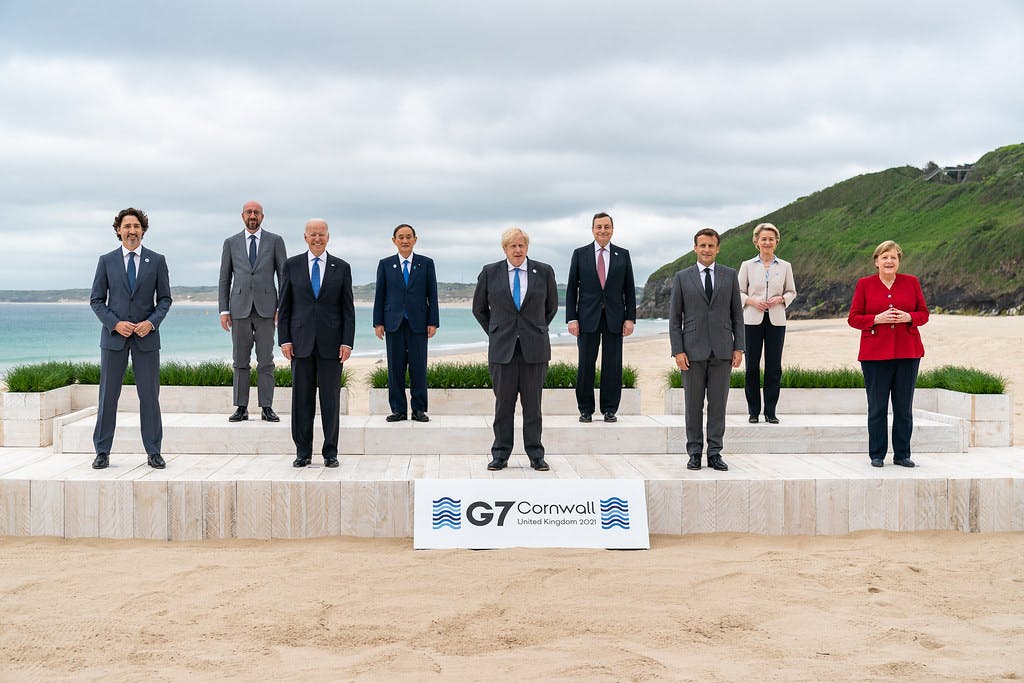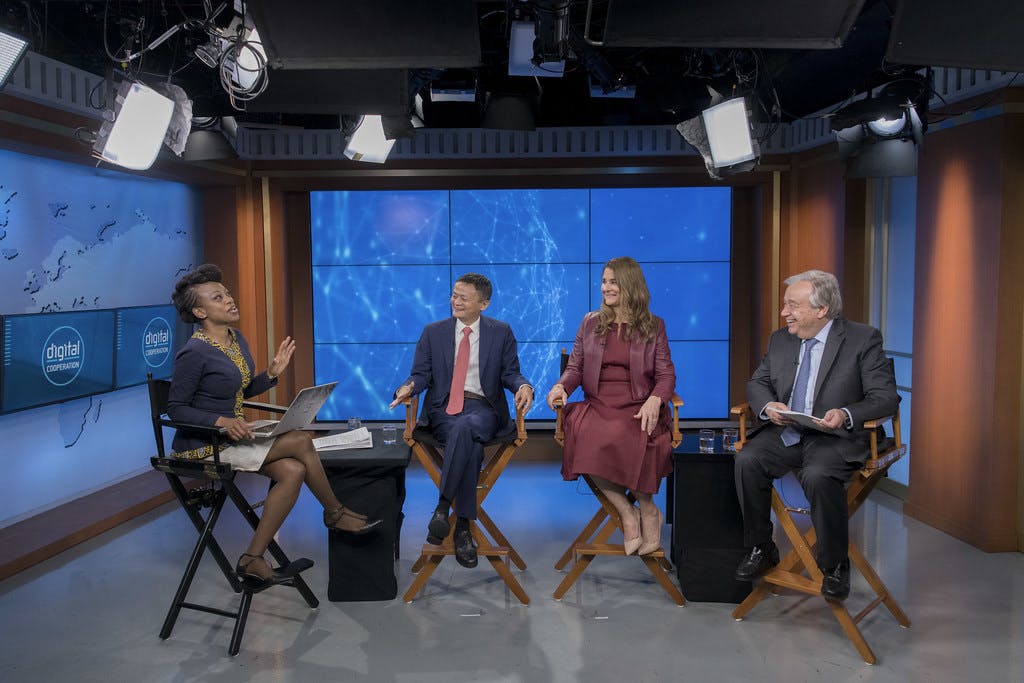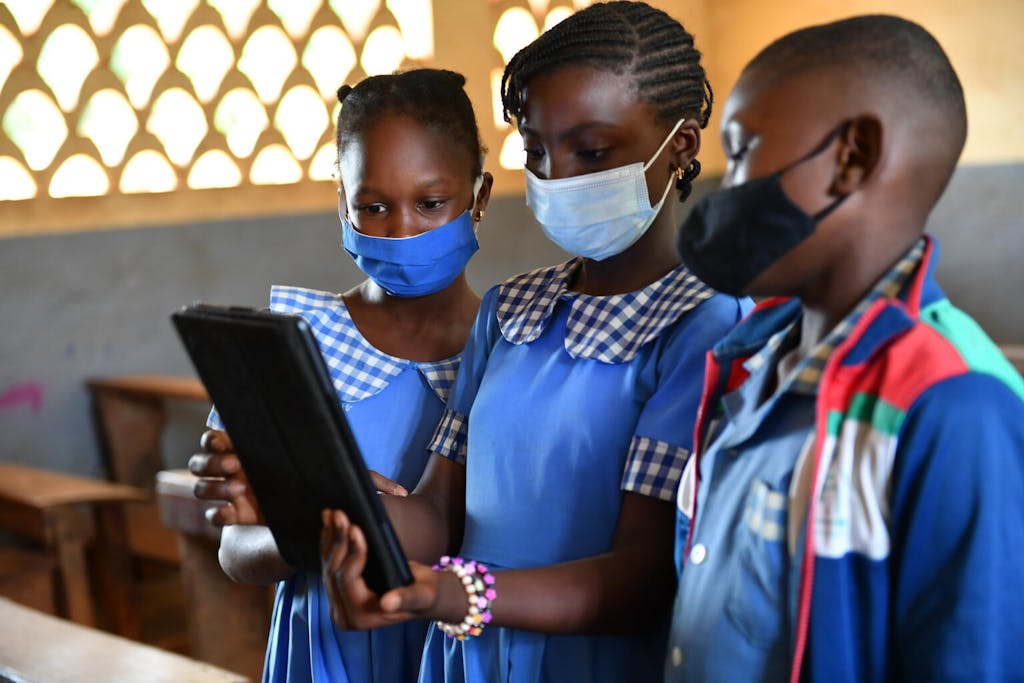Ten years ago, Marc Andreessen, the entrepreneur and investor who co-created the first widely used web browser, famously wrote, “Software is eating the world,” describing the transformation underway across the global economy amid the rise of digital platforms. Having “eaten” the world, software is now consuming international politics. As software and digital technologies have become a central engine of economic growth and core national security interests in the decade since Andreessen coined the phrase in a Wall Street Journal op-ed, technology has also become a driving geopolitical force and has soared to the top of global policy discussions.
COVID-19 has accelerated this trend. As the world became more dependent on digital technologies than ever before, the pandemic also raised the costs for nearly half of the world’s population that remains on the wrong side of the global digital divide. And although we have relied on digital technologies to stay connected during the pandemic, COVID-19 also accelerated digital threats faced by individuals, communities, and societies, amounting to a “cyber pandemic” of digital attacks, ransomware hacks, and surges in online harassment and abuse. At the same time, technology has emerged as one of the most important facets of rising geopolitical tensions, particularly between the United States and China. Each is seeking to lead and set the rules of the road for technology in the 21st century. In the meantime, Europe is setting out its own regulations and plans to protect and preserve human rights from digital and emerging technologies that are emerging as de facto global rules.
It’s no surprise then that world leaders have dedicated increasing attention to tech issues, from cybersecurity to closing the digital divide.

Already this year, the G7 group of leading global economies agreed to work together to build a trusted digital ecosystem while affirming that “future frontiers of the global economy and society — from cyber space to outer space — will determine the future prosperity and wellbeing of people all over the world in the decades ahead.” G20 countries stepped up their cooperation through a new digital economy working group. The United States and the European Union agreed to establish a Trade and Technology Council to deepen transatlantic cooperation on technology. And more than 130 countries came together to agree to overhaul international tax rules to reflect the digitalization of the global economy.
Technology issues are also at the top of the agenda at the UN, which recently marked one year since Secretary-General António Guterres issued his Roadmap on Digital Cooperation identifying areas to work together for a positive global digital transformation. The UN Security Council has already met three times this year on digital and tech issues on how emerging technologies are shaping matters of international peace and security, on the growing threat of cyberattacks, and on the link between technology and peacekeeping. Member States also reached agreement on recommendations for advancing peace and security in cyberspace and underscored the role of digital technologies in achieving the Sustainable Development Goals (SDGs).
As news cycles in 2021 continue to be dominated by cyberattacks, human rights abuses, and heightened geopolitical tensions between the U.S. and China, several important policy discussions are scheduled in the months ahead that will serve as crucial moments for multilateral technology governance. Where should we look in the coming months?
September: UN General Assembly and the Trade and Technology Council
In September, eyes will turn to New York during UN General Assembly high-level week. Digital and tech issues are likely to feature throughout the week, from the COVID-19 “infodemic” to the digital threats posed to Afghans in the rapidly unfolding humanitarian and security crisis. Digital cooperation is also expected to be a key theme in a forthcoming report by the UN Secretary-General on Our Common Agenda, a series of recommendations to deepen international cooperation to tackle shared challenges. World leaders will use a portion of their time in their addresses to the General Assembly to put forth their vision of key opportunities and critical fault lines for global tech policy. They may also reflect on the role of the UN in fostering cooperation, channeling competition, and avoiding the most catastrophic risks of new technologies.

Also in September, the United States and the European Union will hold the first meeting of the recently formed Trade and Technology Council, which seeks to deepen transatlantic trade and cooperation on international tech policy and standards, and support global efforts to promote a “democratic model of digital governance.” Also planned for September, though it may be postponed to later in the fall, is the United Kingdom’s Future Tech Forum, which builds on the UK’s G7 presidency this year and will convene like-minded democratic partners to discuss the role of technology in supporting open societies and tackling global challenges.
Further Reading
- Reviewing the G7 summit with the UK Sherpa
- The UN Security Council Tackles Emerging Technologies
- Unexpectedly, All UN Countries Agreed on a Cybersecurity Report. So What?
- The United Nations needs to start regulating the “Wild West” of artificial intelligence
October: World Data Forum and G20 Summit
October will kick off in Bern where data and policy experts from governments, civil society, the private sector, media, and others will come together for the World Data Forum. The forum, which is supported by the UN Statistical Commission and the UN Department of Economic and Social Affairs, seeks to accelerate innovative uses of data to advance sustainable development and to tackle pressing global data issues. This year’s program will focus on how to use data to ensure an inclusive and sustainable COVID-19 recovery, delivering on the commitment to Leave No One Behind, and building trust in data through data principles and governance.
Later in the month, world leaders will convene in Rome for the G20 Summit. One key item of business will be agreeing to final touches on new tax rules for the world’s largest companies, many of which are in the tech sector. The new rules will create a global minimum tax rate of at least 15% and will allow countries to tax these large companies in the places they do business, in the hopes of averting a “race to the bottom” on global tax rates.

G20 leaders are also expected to discuss the opportunity of the global digital transformation and the priority of ensuring that the digital revolution benefits all, including closing the global digital divide. The stakes are high for nearly half of the world’s population that is not online. And although millions of people in developed countries remain unconnected, the divide between the world’s wealthiest and poorest countries is stark. Nearly 90% of people in developed countries have internet access, compared with only 19% in the world’s least developed countries. The Secretary-General has warned that the digital divide threatens to become the new face of global inequality.
The G20 summit will also be an opportunity to revisit and build on the Group’s earlier commitments on digital and technology issues, including the 2019 G20 artificial intelligence (AI) principles. G20 finance ministers will meet in the lead-up to the summit and, in addition to resolving any last points on the tax agreement, are expected to discuss the implications of central bank digital currencies.
Further Reading
- 130 countries and jurisdictions join bold new framework for international tax reform
- Affordable Internet — Journey from 1 to 5
- The Progressive Case for Universal Internet Access: How to Close the Digital Divide by 2030
- Central bank digital currencies for cross-border payments
November: AI Ethics and Critical Discussions in Paris and Copenhagen
November is AI month in Paris as UNESCO, the United Nations Educational, Scientific and Cultural Organization, is expected to take up the world’s first global AI ethics recommendation at the organization’s annual General Conference. In development for two years, this instrument is intended to provide a framework for the ethical development and deployment of AI that protects and promotes human rights and human dignity. Although there has been a proliferation of initiatives to chart out AI ethics and principles in recent years, the UNESCO recommendation seeks to offer the first global framework, including around issues related to transparency, accountability, privacy.

In the same month, the City of Light will also host the Global Partnership on Artificial Intelligence summit and the Paris Peace Forum. Now in its third year, the Paris Peace Forum serves as a platform for debate, as well as to showcase projects working to solve pressing global challenges, including those posed by AI and digital technologies. The Global Partnership on AI was launched in 2020 to foster responsible AI in a multistakeholder process with researchers, civil society, the private sector, and international organizations. It was borne out of the consecutive G7 presidencies of Canada and France, and now consists of 18 countries and the European Union. November’s summit may serve as an opportunity to announce new members.
These three events come at a pivotal moment. As AI increasingly powers everything from health care to education to employment to weapons, the threats to individuals, communities, and societies come into sharper focus. Today’s risks include bias, deepening inequality, and harms to privacy and other human rights.
Looking north from Paris, Copenhagen will host the Tech for Democracy summit in November, bringing together governments, tech companies, media, academia, and civil society and focused on how technologies can be used to strengthen and support democracies around the world.
One important meeting that was scheduled for November that has since been pushed to June 2022 due to COVID-19 is the International Telecommunication Union (ITU) World Telecommunication Development Conference in Addis Ababa. Usually held every four years, the WTDC helps to set the strategies and objectives for the ITU’s development work and next year’s conference, the first held in Africa, will focus on closing the digital divide and delivering digital solutions to all. On the sidelines, a main topic of discussion will likely be the campaign underway to pick the successor to the ITU’s current Director-General, Houlin Zhao, when his second term ends next year.
Further Reading
- Global Partnership on AI Mid-year Rendez-Vous
- OECD AI principles
- Principled Artificial Intelligence: Mapping Consensus in Ethical and Rights-Based Approaches to Principles for AI
- Managing the transition to a multi-stakeholder artificial intelligence governance
December: A Crucial Moment for Internet Governance, and Discussions on Weapons and Online Freedoms
In December, Katowice, Poland, will host the Internet Governance Forum (IGF) under the theme Internet United. Unfortunately, the title is more aspiration than reality, as forces working to splinter the digital world have gathered strength throughout the COVID-19 pandemic, threatening the open and global internet upon which we all rely. That makes this year’s IGF a crucial moment for setting out a vision for a shared and inclusive digital world. The Internet Governance Forum brings together stakeholders across the complex network of global digital cooperation, including from the developing world. Efforts over the past two years, such as through the Secretary-General’s Roadmap on Digital Cooperation, have worked to build consensus on how to strengthen this body into an “IGF-plus.” One proposal is to create a high-level multistakeholder body to focus on urgent issues and better communicate between IGF discussions and other global internet bodies.
Also in December, member states will meet in Geneva for the sixth review conference of the Convention on Certain Conventional Weapons. Although it might seem a rather unconventional forum to discuss rapid advancements in AI-powered weapons, a group of governmental experts on lethal autonomous weapons systems was established at the convention’s last review conference in 2016 to assess urgent questions on the development and use of this new class of arms. At the review conference in December, member states will decide what comes next. The group has made important strides since it was established, including articulating a set of guiding principles around lethal autonomous weapons, but it has not kept pace with the rapid advances in the development of the weapons themselves.
Finally, the United States plans to convene a Summit for Democracy in December, bringing together leading voices from government, civil society, and the private sector working to tackle threats faced by democracies, including how digital technologies and the online information ecosystem can threaten the health of democracies around the world. In the past decade, there has been a democratic recession as well as worrying declines of freedom online. The summit is intended to kick-start a year of action by all stakeholders and may generate new commitments on expanding digital access around the world and protecting and preserving rights online.
Further Reading
- UN Secretary-General’s Roadmap on Digital Cooperation
- Options Paper for the Future of Global Digital Cooperation
- An Enduring Impasse on Autonomous Weapons
- The Digital Technology Agenda at the Summit for Democracy
Toward Policy, Consensus, and Better Understanding
So where might that leave us as we ring in the New Year? And what should we hope for as we head into 2022? Even at their most ambitious, these policy discussions won’t solve the overlapping tech challenges the world faces, especially since the months ahead will almost certainly entail new revelations of hacks, spying, and attacks online. But they offer space for policymaking, consensus-building, and better understanding redlines on issues of deep divides. The challenge ahead is accelerating the slower pace of policymaking to better match the warp speed of tech development. Without doubt, 2022 will include even more important multilateral tech policy discussions.





